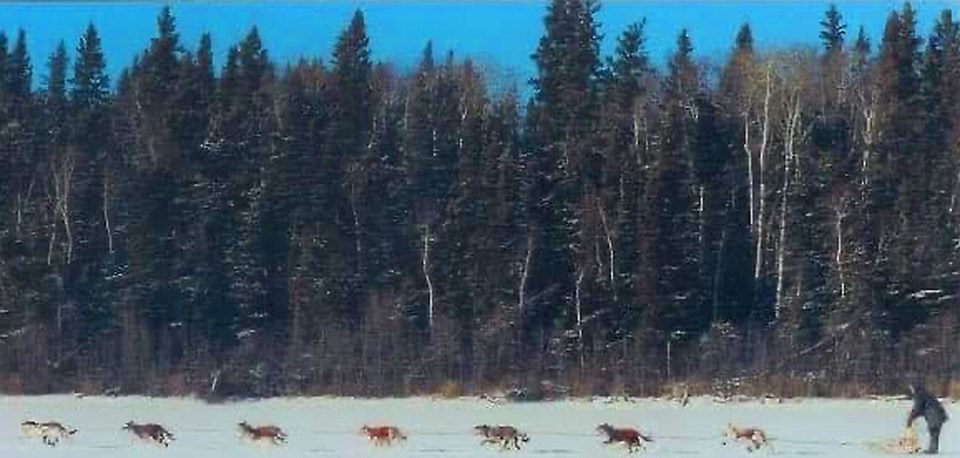DENARE BEACH — Paws will be paced and sleds will fly over frozen lake ice during the area’s first organized sled dog race in years, organized in honour of a long-time former musher by his son.
The first annual Jimmy Custer Memorial Sled Dog Race will take place at Denare Beach and on Amisk Lake Feb. 11-12. The event will include a pair of races on both days - one race each day for six-dog and 10-dog teams. The 10-dog race will take place at 10 a.m. sharp on both Feb. 11 and 12, with the six-dog race starting at 11:30 a.m. on both days.
The races are held in honour of former Denare Beach dog musher Custer and organized by his son, Wally Olson, working along with partner Vanessa Campbell. The races are meant to both pay tribute to Olson’s father and help resurrect what is, in many places including Flin Flon and Denare Beach, a dormant sport.
“This was something I wanted to do in his honour, since his passing. With the support of my partner, we’re now able to do this,” Olson said.
“That’s the whole purpose. It’s very, very important to us. My partner and I grew up doing this very thing - it’s kind of in our hearts already. It definitely means a lot to us.”
“Me and Wally are outdoors people. We love dogs,” Campbell said.
“We both grew up on this. It was our livelihood. It was our transportation. It was everything to us, dog racing - we are very passionate about it.”
Custer was a known dog musher and trainer who took part in races across Canada. His team of 14 dogs would run dozens of kilometres up and down Amisk Lake every winter in preparation for major races - it’s on a route up and down the same lake, partially using trails maintained by the Border Explorers Snowmobile Club with their permission, where Olson hopes to bring the dogs back.
“Everybody comes in the night of - mostly because they’re coming from far and wide. We’re expecting teams from The Pas, from Prince Albert area, Meadow Lake, even teams from the Northwest Territories,” Olson said.
“They’ll be in for the weekend and on Saturday morning, we’ll have registration at the race site.”
Sled dog racing holds a crucial part of northern history, dating back to when dog teams were a primary form of winter transport, used to carry cargo and passengers alike.
“Dog teams were used as a means of travel, of transportation. I guess how dog racing got going was somebody bet someone - ‘I bet my team is faster than yours to deliver groceries,’ that sort of thing,” said Olson.
“With the introduction of snowmobiles, it’s died down - there’s probably not many people nowadays that travel by dog team.”
Major dog racing events are still held around North America, including the famed Iditarod, a thousand-mile event run every winter in Alaska. In northern Manitoba and Saskatchewan, few races still take place, such as the Hudson Bay Quest race from Gillam to Churchill, or the World Championship races held as part of the Northern Manitoba Trappers’ Festival in and around The Pas. In the one year where dogsled racing was part of the Winter Olympics, back in Lake Placid, N.Y. in 1932, northern Manitobans owned the race - The Pas’ Emile St. Godard claimed gold, while Flin Flon’s William “Shorty” Russick took bronze.
Despite that heritage, organized dogsled races have not been held in the Flin Flon or Denare Beach areas for several years. No formal dog teams currently call the area home.
“It’s been upwards of 20 years - I’m not exactly sure when the last one was, but both Flin Flon and Denare Beach used to have their own dogsled race. I think Flin Flon withdrew and then Denare Beach had a race for a year or two after that - my dad took over one year for it,” Olson said.
“It’s a sport that’s definitely fading. It’s our effort to keep the sport alive, to showcase the work that goes into it.”
“There are no dog mushers in Flin Flon and Denare Beach - yet,” said Campbell.
It takes a lot of time and effort to look after the dogs - Custer himself would carefully check out each of his dogs before and after practices and competitions, feeding each one homecooked food from his own stove to prepare them for the run. Other mushers are no exception - the dogs are not just animals, they’re athletes 小蓝视频 put through their paces.
“They’re eating very high protein, the best of the best… they’re athletes, and anyone who shows up will see that, how fast they actually go,” Olson said.
“It’s only a short race, it’s only 12 miles, but it won’t take them very long at all.”
While there haven’t been races in years, Campbell and Olson both say that community response to the race has been positive. Funds to organize the event and guarantee the participants’ purse have come in, along with people wanting to help out and volunteer. Campbell said it has been positive, adding that the event will be an alcohol-and-drug-free event and that they hope to attract families.
“It's kind of a good engagement with the community, as a drug and alcohol-free community event. Everyone is welcome. We’re hoping for a good turnout,” she said.
“The fundraising was slow at first, but now that they've actually seen the posters and the word is out now, different establishments and businesses have reached out wanting to contribute. It’s working out very well with community support.”




